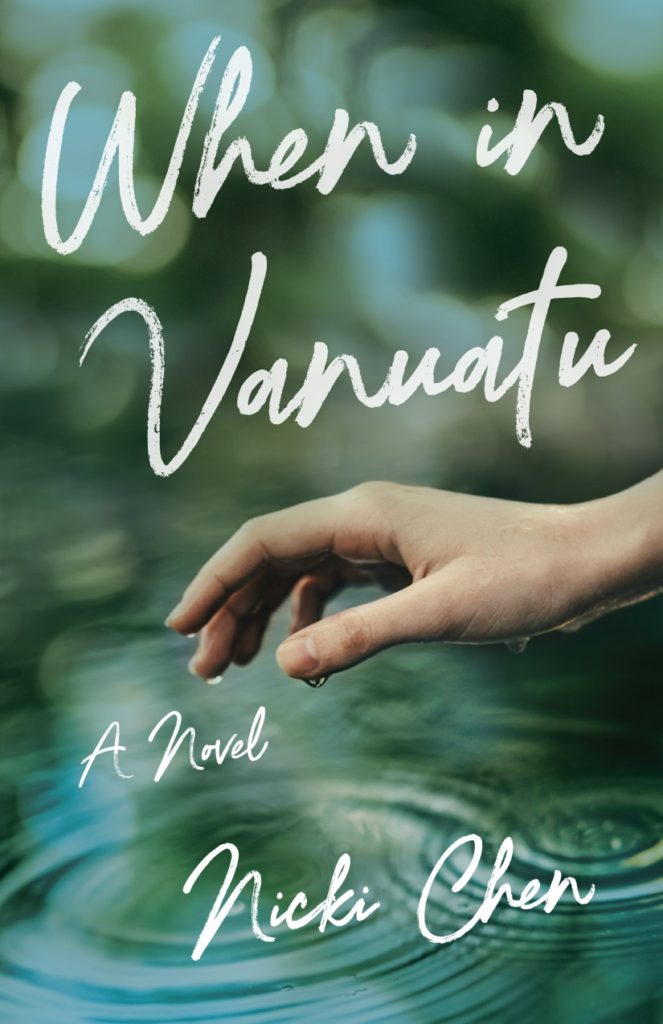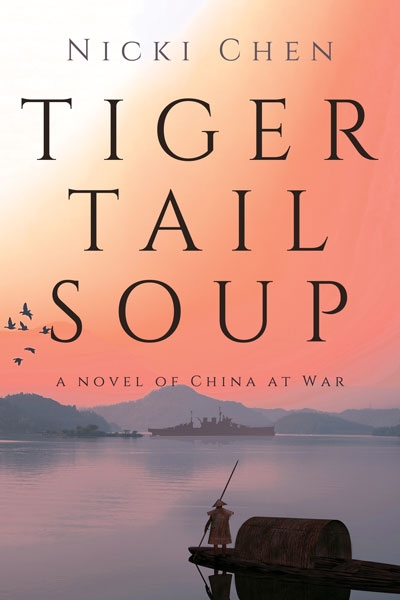My novel looks so different in translation. I look at all those Chinese characters and I wonder, is this really my novel?
If only I could read Chinese! I did study it for a while. But that was years ago, and with the passage of time, the words just slipped away from me, one word after the other.
 So here I am, looking at the cover of my book and recognizing only the waves I painted when I might have been studying Mandarin.
So here I am, looking at the cover of my book and recognizing only the waves I painted when I might have been studying Mandarin.
Even if I had put more effort into learning Mandarin, I’d still be faced with another problem. My teacher in the Philippines taught reading and writing with traditional Chinese characters. This translation was done in the simplified characters that are now the standard in China.
(A side note: There are multiple spoken Chinese languages. The most well known of the ten major varieties are Mandarin, Shanghainese, Hokkien, and Cantonese. All of them use the same written language, however. In Mainland China they use the simplified form of that written language. In Taiwan, Hong Kong, and Macao, they still use the traditional characters.–See herschelian‘s comment below on Hong Kong.)
On March 29, the Chinese translation of Tiger Tail Soup went live on Amazon China and on Amazon.com. Soon I will find out what Chinese readers think of it–a story written by an American woman that tells about wartime in their country.
The translators, Echo, Ethan, and Yang, seemed to like it. So that gives me some confidence.
The way I look at it, after a book has been translated, it belongs not only to the author but also to the translators. Ultimately, though, a book belongs to the readers, who take whatever meaning they choose from a book.
 The other “owner” of Tiger Tail Soup, is my late husband, Eugene. The stories he told me about his childhood in China were my inspiration for writing a novel about the Japanese invasion there. Over thirty years of marriage, Eugene often reminisced not only about the danger, suffering, and privation of China’s war with Japan but also about everyday life on the beautiful little island of his birth, Gulangyu.
The other “owner” of Tiger Tail Soup, is my late husband, Eugene. The stories he told me about his childhood in China were my inspiration for writing a novel about the Japanese invasion there. Over thirty years of marriage, Eugene often reminisced not only about the danger, suffering, and privation of China’s war with Japan but also about everyday life on the beautiful little island of his birth, Gulangyu.
 If you’d like to read Tiger Tail Soup, either in English or in Chinese, you don’t have to go to Amazon China. They’re both available now on the regular Amazon page.
If you’d like to read Tiger Tail Soup, either in English or in Chinese, you don’t have to go to Amazon China. They’re both available now on the regular Amazon page.
(Also available at barnesandnoble.com, Apple Ibooks, and your favorite bookstore.)
If you know anyone who reads Chinese, I’d really appreciate it if you’d tell them about the translation of Tiger Tail Soup.
Thank you so much.







Congratulations on your Chinese edition! Translators have plenty sway, deciding which words to use as language tends to have nuance and connotation… Is Chinese like that? You know, a word denoting one thing but connoting another?
Both the traditional and simplified Chinese look difficult to me! I guess English looks daunting to those who don’t write it.
All the very best and I hope the Chinese audience loves it.
From what I understand, the Chinese language is rich in nuance. The translators were very thoughtful about getting back to me to try to be sure they understood what I meant.
Chinese is a difficult language. To become literate, a person should know between 3000 and 4000 characters. I read once that when the US State Department is preparing to send their employees abroad, they require a nine-month-intensive language program for learning most European languages and a two-year intensive program for learning Chinese.
Wow a difficult language indeed.
Amazing it has a Chinese translation now! Congrats! I’m sure your Chinese readers will like it.
Thanks, Ruth. I’m glad you stopped by. If you have any Chinese friends who would might be interested, please tell them about the book. I’d really appreciate it.
This is so exciting! Really interesting to see it. I’ve always wondered how language translations for books/covers works.
I don’t know what the typical way of doing a translation is, but I think it’s more common to have one translator rather than three, as I had.
Nicki, your book was a wonderful read! Congratulations on the new version. I think you’ll find an enthusiastic new audience in China!
Thank you, Carol. I hope you’re right about an enthusiastic new audience. I’m sorry they left the photo of a woman off the cover since the story is from a woman’s point of view. I don’t want to disappoint people who are looking for a story filled with battlefield action.
Yes, I like the woman on the cover also. Still, I’m sure those readers will love your book as much as I did!
Bravo! I recognize the cover before reading your entire post. But the title of course doesn’t seem familiar at all. They worked fast, didn’t they? It seemed like yesterday when you told us that your novel would be translated in Mandarin. Your husband would be proud and happy to share the news with you. Congrats, Nicki.
Thank you, Evelyne. The three translators were quite fast. But more impressive was how meticulous they were. Each chapter was first translated by one of them. Then it was individually checked by all three of them. I think my husband would be happy to see it–even though he did prefer traditional Chinese characters.
How exciting! Congratulations, Nicki. Your husband would be so proud.
Thank you, Jill. I guess my husband would be proud. He was away from China for many years, escaping to Taiwan in 1949. But as soon as he had an opportunity to return, he jumped at the chance. We were some of the earliest overseas visitors to Amoy, his hometown (now known as Xiamen). Then, when Asian Development Bank where he worked started having projects in China, he also jumped at that opportunity.
Congrats on a magnificent opportunity to share your book with a world-wide audience!
Thank you, Paddy. China may not be the whole world, but it sure is a big chunk of it.
CONGRATS! What a cool achievement, translated into any language. Good luck with your new audience.
Thank you, Mindy. It is a cool achievement.
Loved your book and recommend everyone read it! It’s interesting about the language too. I didn’t realize there were that many different dialects (if that’s what you call them). My grandparents came from Germany and there were two distinctive dialects spoken there.
The Chinese languages are different enough that in many cases they are mutually unintelligible. Like the various Romance languages, they’re related but quite different one from the other. Then, there are hundreds of dialects. My husband’s first language was Hokkien or the Amoy dialect of the Min language. It’s the dialect spoken by many Chinese in Taiwan and throughout SE Asia. When he was a child, his family moved to another city in the same province. On the first day of school, he came home crying because he couldn’t understand what the teacher was saying.
We are lucky here in the US although there are some people from different parts that I can’t understand!
So glad your book has been translated into Mandarin. I downloaded the English version on to my kindle, but now plan to buy a Chinese copy to see how well I’m able to read the characters (using my Kindle as a control!).
Actually about the ‘versions’ of Chinese. For many, many years there was a long debate in China about their written language and from the 19th century onward many Chinese language scholars worked on ways of making the written language more accessible to the masses. The literacy of the Chinese population was poor, learning the thousands of complex characters took a huge amount of time and effort. Eventually Mao (because he had the power to do so) determined that the ‘simplified’ version produced by the scholars should become the lingua franca. Within two decades literacy rose to over 80%. Taiwan and HK held out for what can only be considered political reasons,(nothing stopped intellectuals retaining the ancient characters if they wished to do so) the ‘complex characters’ keep the lower eschalons semi-illiterate, which is far from ideal.
Now ALL children in China (including in HK) have to learn the ‘putong hua’, this is now the written language of daily life, ie the people’s language. It has huge benefits as wherever you are in China and whatever dialect you speak, you can all communicate in writing. Much as Latin was the lingua franca of Europe during the Roman Empire.
Personally I think it was one of the good things that Mao did!
Thank you so much for your explanation of the development of simplified Chinese characters. I should have asked someone in the know about Hong Kong. (I suspected it might have changed over.) Instead, I googled it and got some out-of-date information.
I’ve read through the arguments of proponents on both sides of the debate about simplified vs. traditional characters. There are some good points on both sides. The pro-traditional characters side points out that literacy is higher in Taiwan and that the improvement in literacy in China may have been mainly a result of modernization. My husband, who may have been biased since he was familiar with the traditional characters, criticized the simplified system, saying that it loses the radical and phonetic relationships between the characters. It’s an interesting discussion but since the majority of Chinese readers and writers live in China, I guess that settles it.
Congrats! I hope you get some feedback from Chinese readers soon.
Thanks, Autumn. Looking on Amazon China, I can see how many stars they give the book, but I’ll have to ask someone to help me translate the reviews.
Wooot! Congratulations on the Chinese translation! That’s so awesome, Nicki!
Thanks, Linda. I do hope it sells well in China. They report sales every two months, so I won’t hear for a while. The translators, who get paid a percentage of sales, don’t make anything until the book sells. I guess I’m more concerned about sales for their sake than for mine.